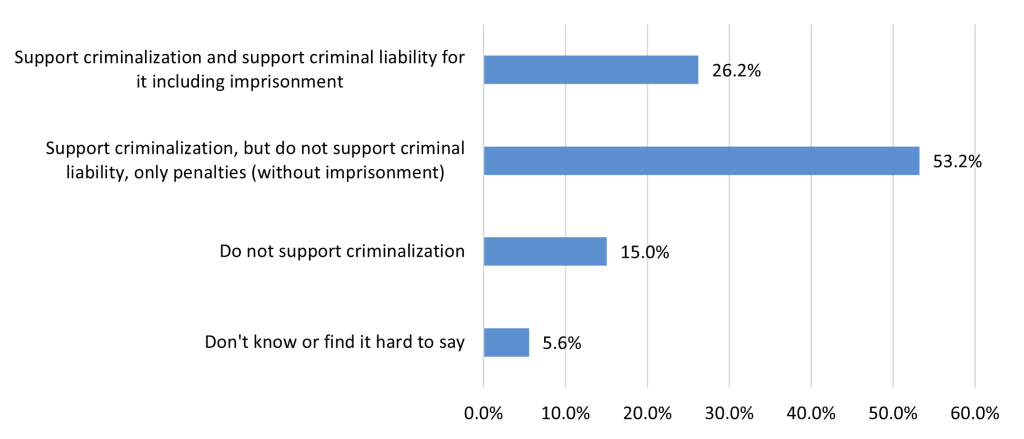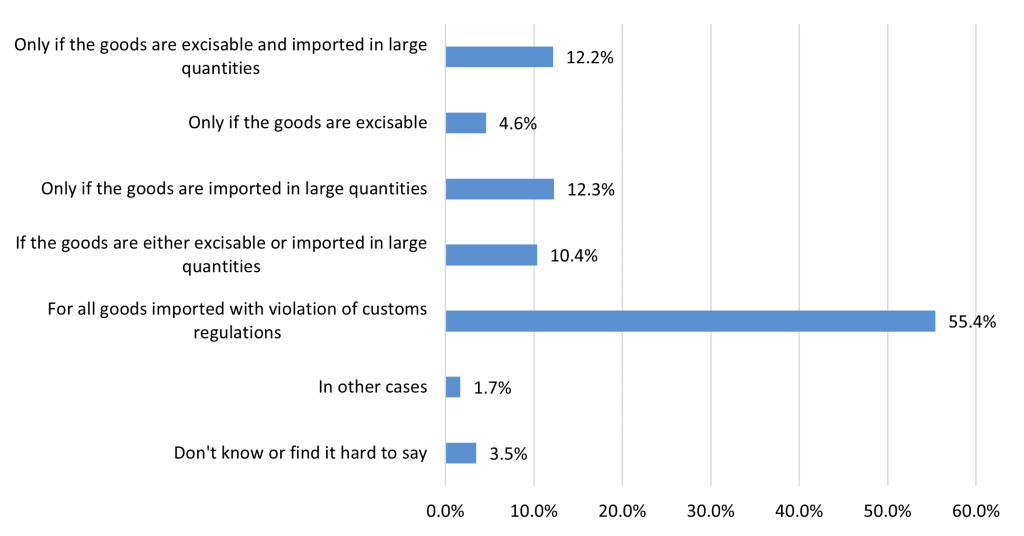Should a smuggler be behind bars? This is not as simple a question as it seems at first glance. Who is a smuggler? In which case should the smuggler be held criminally liable? And what exactly is this liability?
Should there be a liability for transporting three bottles of vodka and three blocks of cigarettes without paying customs duties? Or for importing 10 packs of cigarettes? Or a sea container of cigarettes? Should smuggling worth $ 100 or $ 100,000 be criminally punished? And if this amount is $ 99,998? Who and how will determine the amount of this smuggling?
And if the import was legal, and six months later the errors in the documents had been found? Is this already smuggling? These and many other issues arise while analyzing the consequences of criminal liability for smuggling implementation 1 .
In the last few years, there have been proposals in Ukraine to criminalize smuggling. In 2017-2018, several regulations were registered in the parliament, which proposed strengthening the liability for such actions.
The European Union has recently strengthened liability for smuggling. On 5 July 2017, the European Union approved Directive № 2017/1371 of the European Parliament and the Council of the EU, which stipulated that by July 2019 all EU member states should establish a minimum criminal penalty for crimes against the EU’s financial interests: four-year imprisonment in case of significant harm or significant gain.
For certain crimes, a different penalty could be provided if the damage/benefit was less than 10 thousand euros.
Some member states have had criminal penalties for smuggling before. For example, in Poland, the Criminal Finance Code (its 1999 version) provides for a fine or imprisonment for smuggling. In Germany, “illegal import, export, and transit of goods” is a tax crime.
Historical Background
Until 2012, large-scale smuggling in Ukraine entailed criminal liability. The Criminal Code of Ukraine (CCU), as amended on April 5, 20012, contained Article 201 on Smuggling. According to it, smuggling was considered
“large-scale movement of goods across the customs border of Ukraine outside customs control or with concealment from customs control, as well as the illegal movement of historical and cultural values, poisonous and potent substances, explosives, radioactive materials, weapons, and ammunition (except for smooth-bore hunting weapons and ammunition for it), special technical means for covert information receiving, as well as smuggling strategically important raw materials, in respect of which the legislation establishes the relevant rules for export outside Ukraine”.
According to the note to this article, the large-scale smuggling of goods was considered if their value overtops the tax-free minimum income of citizens a thousand times or more.
In 2011, an active campaign was launched to promote the idea to partially decriminalize this crime. Among other things it was proposed to exclude from the disposition of part one of this article such corpus delicti as “large-scale movement of goods across the customs border of Ukraine outside customs control or with concealment from customs control” and “smuggling strategically important raw materials in respect of which the legislation establishes the relevant rules for export outside Ukraine”.
The sanction for such acts was imprisonment for a term of three to seven years with confiscation of contraband, and in case of repeated acts or acts by prior conspiracy by a group of people the term was from five to twelve years with contraband and property confiscation.
Thus, it was proposed to leave only criminal liability for illegal movement of objects whose free circulation is restricted or prohibited across the customs border of Ukraine.
In 2011, the idea of inexpediency and inhumanity of criminal punishment for smuggling and some other financial crimes was actively discussed in public. It was proposed to replace criminal liability for these crimes with an administrative offense with a simultaneous strengthening of financial liability for such actions.
Among the arguments put forward by supporters of these changes were the following: the need for general humanization of penalties for economic crimes; overestimated the level of criminalization of offenses in economic activity in Ukraine; abuse by law enforcement agencies while bringing entrepreneurs to justice and its negative impact on economic entities the activities; as a positive consequence of the relevant changes, an argument was made regarding additional revenues to the state budget through the simplification of the procedure for bringing perpetrators to justice and more prompt offense objects confiscation into state revenue.
The explanatory note to the relevant draft law also contained a reference to European practice, according to which the liability for this type of crime had to be humanized.
It should be noted that these arguments continue to be relevant today, and none of them has lost its significance.
Taking into account the arguments above, on November 15, 2011, the Verkhovna Rada agreed to decriminalize the relevant acts by adopting the Law of Ukraine № 40253. According to these amendments, today
“smuggling is considered to be moving across the customs border of Ukraine outside customs control or with concealment from customs control of the cultural property, poisonous, potent, explosive and radioactive materials, weapons or ammunition (except smooth-bore hunting weapons or ammunition), parts of firearms, as well as special technical means for covert information”.
Thus, since 2012, the movement of goods across the customs border of Ukraine outside customs control or with concealment from customs control is not smuggling and is not considered a criminal offense.
Since then, discussions about the correctness of such a step have not stopped. Taking into account the negative impact of smuggling on Ukraine’s economy4, there are calls to resume criminal liability for such acts. And in the last few years, such discussions have not only intensified but also had a concrete formalized manifestation in the relevant draft laws.
Discussions on various options for criminalizing acts of illegal movement of goods across the border are still ongoing. The choice concerns the following important issues: to criminalize smuggling or increase administrative liability, and if to criminalize it then for all goods or only for certain categories, for all amounts or only for significant amounts (i.e. set a minimum threshold) and with which sanctions: imprisonment or criminal liability without imprisonment.
Stakeholders’ Position
Stakeholders in the issue of criminalization of commodity smuggling include a fairly wide range of people. In a broad sense, this is all Ukrainian society and state institutions. Smuggling directly or indirectly affects all social groups, but this impact is different.
In the Fifth Annual Survey of 1000+ exporters and importers5, respondents were asked about their attitude to the implementation (restoration) of criminal liability for moving across the customs border of Ukraine outside customs control or with concealment from customs control of goods not covered by Articles 201 -2011 of the Criminal Code of Ukraine (commodity smuggling).
53.2% of respondents believe that criminal liability for commodity smuggling should be introduced, but without imprisonment, i.e. limited to the imposition of fines. 26.2% of respondents support the criminalization of commodity smuggling, including imprisonment for such actions. 15% of respondents oppose criminalization, and 5.6% could not express their opinion on this issue.
Figure 1: Support for the criminalization of commercial goods contraband, the % of the respondents
 Source: Results of the Fifth Annual Survey of 1000+ exporters and importers, conducted in 2020
Source: Results of the Fifth Annual Survey of 1000+ exporters and importers, conducted in 2020
Thus, the majority of interviewed representatives of exporters and importers in Ukraine believe that the illegal moving of goods across the border should be criminalized, but the sanctions should be financial.
Respondents who answered that criminal liability should be implemented for commodity smuggling were asked to determine the type and amount of smuggling to be criminalized.
More than half of the respondents (55.4%) consider it necessary to introduce criminal liability for the smuggling of any goods, regardless of quantity.
Significantly fewer respondents (from 10.4% to 12.2%) support one of the following three options: only if these goods are excisable and imported in large quantities, only if these goods are imported in large quantities, and if these goods are either excisable or imported in large quantities. And only 4.6% of respondents consider it necessary to criminally punish the smuggling of only excisable goods.
Figure 2: Opinions regarding the cases for the criminalization of smuggling of commercial goods, % of the respondents among those who supported the criminalization
 Source: Results of the Fifth Annual Survey of 1000+ exporters and importers, conducted in 2020
Source: Results of the Fifth Annual Survey of 1000+ exporters and importers, conducted in 2020
Thus, the respondents spoke quite clearly. The majority of respondents were in favor of criminal liability for goods smuggling, regardless of the quantity and type of goods, without distinguishing between the so-called excisable group of goods and ordinary household products.
This correlates with the respondents’ views on what exactly the responsibility of liable persons should be. It is a question of a ratio of an insignificant quantity of the goods smuggling and liability for it. In the case of imprisonment for the illegal movement of several cigarette packs, the disproportion between punishment and crime is traced. In the case of the possibility to apply an alternative punishment (fine or ban on travel abroad), such liability may be interpreted as adequate to the damage caused to the state.
During April-June 2020, two regional advocacy campaigns were conducted in the Volyn and Kherson regions, dedicated to the issue of criminalization of goods smuggling. In general, the participants made the following conclusions:
Today, the state does not have enough tools to overcome commodity smuggling. Accordingly, the introduction of criminal liability for smuggling is necessary.
It is important to be able to apply alternative to imprisonment criminal liability for commodity smuggling (fines, seizure of contraband, and other sanctions), but in the framework of criminal proceedings with all the relevant consequences. The approach to solving the problem of smuggling should be comprehensive.
Thus, the survey and in-depth research showed that representatives of business and the state support the criminalization of illegal goods transportation across the border, but subject to applying sanctions alternative to imprisonment for this offense.
It was also stressed the need for an integrated approach to combating smuggling, which includes not only its criminalization but also establishing an effective law enforcement system.
Effectiveness of Punishment
The majority of respondents to the Fifth Annual Survey of 1000+ exporters and importers, as well as business and government representatives who participated in regional advocacy campaigns, generally support the commodity smuggling criminalization. In this case, a logical question arises: would such a tool be effective if it is implemented.
The effectiveness of punishment directly depends on the conditions stated in the regulations, and the actual practice to apply these rules by law enforcement agencies and courts. The combination of options formulated by the legislator in normative acts and the practice to enforce these norms by law enforcement agencies and courts, together form the relevant tool and its effectiveness.
CASE Ukraine expert Andriy Savarets cited statistics in the article “Criminally unpunished smuggling”6, which indicates the inefficiency of the criminal penalties system for all groups of goods smuggling, which was in force until 2012, and the dubious effectiveness of criminal penalties after 2012. According to Andriy Savarets,
“before the abolition of criminal liability for goods smuggling in 2011, only three people received real terms of imprisonment for smuggling goods. Eight people serve probation, and 12 people were commuted to lesser sentences, including fines (10 people) and arrest (2 people)”.
A similar situation is observed with the investigation of criminal proceedings on smuggling and bringing the perpetrators to justice in 2018. Thus, in the already mentioned article, Mr. Savarets provides an information analysis for 2018:
“According to statistics from Ukraine’s Prosecutor General Office official website in 2018, 125 criminal proceedings for smuggling of weapons and cultural property and 212 criminal proceedings for drug smuggling were registered. What is the future of these cases? Only half of the opened criminal proceedings were heard in court, and even fewer sentences were handed down. However, another interesting question is: what are these sentences? Usually, real terms are seldom awarded, and judges are satisfied with fines and suspended sentences”.
Proponents of the smuggling criminalization believe that increasing the responsibility for such actions will reduce the number of rules violations while moving goods across the customs border of Ukraine, create conditions for greater receipt of relevant customs payments to the state budget, and positively affect the national economy.
However, the question on the effectiveness of law enforcement of tougher (criminal) sanctions in Ukraine remains open, as a successful fight against smuggling is impossible without effective law enforcement and judicial system.
As long as the general justice system does not perform its function, strengthening sanctions is more likely to increase corruption rather than reduce crime.
Conclusions
Despite some contradictions inherent in the positions of different stakeholders, several main conclusions can be made:
- Currently, the state does not have effective tools to combat commodity smuggling.
- There is a high level of support among business and government officials for increasing the need to strengthen liability for smuggling by implementing criminal liability for such acts.
- There is a widespread opinion among stakeholders that criminal liability should not be introduced in the form of imprisonment. Instead, it is proposed to apply other types of sanctions in terms of criminal liability.
- An effective fight against smuggling is impossible without effective law enforcement and judicial system, and the use of the full range of customs instruments.
- A real fight against smuggling is possible only due to a systematic approach and implementation of a set of different measures. The introduction of criminal liability for goods smuggling in itself, without implementing other instruments in the customs will not solve the problem.
Recommendations
- Before making decisions on the criminal liability for goods smuggling, it is necessary to hold a broad public discussion on this issue with the involvement of all stakeholders to avoid making ill-considered decisions.
- When working out a decision on the commodity smuggling criminalization, attention should be paid to sanctions alternative to imprisonment for such an offense. Such sanctions may include: the imposition of significant fines, the confiscation of not only contraband objects but also contraband means, including cars, the seizure of all property, a ban on travel abroad, and so on.
- This approach will ensure both the potentially high effectiveness of the sanction and its humanity to the offender compared to imprisonment. This approach is also a compromise option, which can combine the positions of supporters of strengthening liability for smuggling and opponents of its re-criminalization.
- In any case, the authorities should avoid hasty decisions and analyze the various options and their consequences. Amidst the imperfection of the law enforcement system and the existing problems in the judicial system of Ukraine, hasty criminalization may not only not solve the existing problem, but also contribute to additional corruption of export-import activities and increase the risks of law enforcement interference in business activities.
This article was prepared in the framework of the project “Support for Public Initiative “For Fair and Transparent Customs” (hereinafter – the Project), implemented by the Institute for Economic Research and Policy Consulting” (IER) with the financial support of the European Union, the International Renaissance Foundation and ATLAS Network.
The author’s views expressed in the research may not coincide with those of the Institute for Economic Research and Policy Consulting. The content of the document can in no way be interpreted as the position of the European Union, the International Renaissance Foundation, and the ATLAS Network.
1 In this paper, the concept of goods smuggling means moving across the customs border of Ukraine out of customs control or with concealment from customs control of goods that are not covered by Articles 201-201-1 of the Criminal Code of Ukraine.
2 Criminal Code of Ukraine, (Vidomosti Verkhovnoi Rady Ukrainy (VVR), 2001, № 25-26, p.131), link to the Verkhovna Rada website https://zakon.rada.gov.ua/laws/show/2341-14#Text
3 Verkhovna Rada of Ukraine website https://bit.ly/31xmtM2
4 Research of the Ukrainian Institute for the Future «Kontrabanda» https://bit.ly/3hrF95c
Article “Customs wars: how smuggling affects legal business”, author: Hryhoriy Kuukuruza, an economist at «Ukraine Economic Outlook» September 18, 2019 https://bit.ly/3aYI56P
5 This section uses information and data from the Fifth Annual Survey of 1000+ exporters and importers in 2020.



